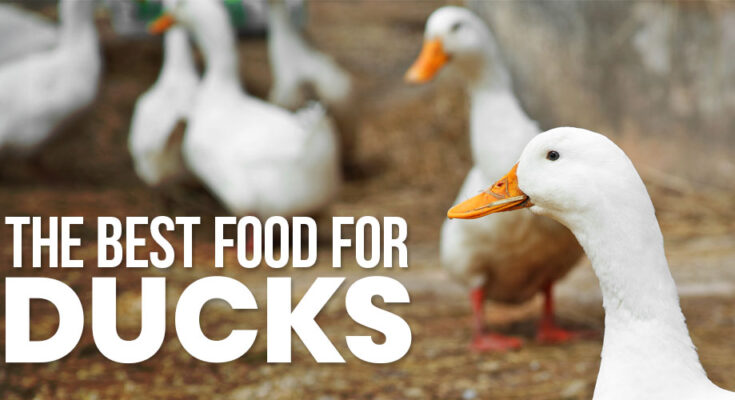Ducks are amazing birds. They are friendly, social, and fun to watch. Whether you keep ducks as pets, for eggs, or simply enjoy feeding them in the park, knowing what food is best for them is very important. Ducks, like all animals, need the right nutrition to stay healthy and active. In this guide, we will explain duck food in simple words so you can easily understand how to feed them properly.
Why Is Proper Food Important for Ducks?
Food gives ducks the energy to swim, walk, and grow. A good diet also helps:
- Keep their feathers soft and shiny
- Support strong bones and muscles
- Improve egg production (for laying ducks)
- Keep them healthy and prevent diseases
If ducks eat poor or unhealthy food, they can get weak, have feather problems, or even fall sick. That’s why feeding them the right food is an important part of caring for them.
What Do Ducks Eat in the Wild?
In the wild, ducks are great foragers. They eat:
- Grass and plants
- Seeds and grains
- Small insects and worms
- Aquatic plants
- Snails and small fish (sometimes)
Their natural diet is mixed, giving them all the nutrients they need. When you keep ducks at home or feed ducks at a pond, you should try to give them similar nutritious food.
Types of Duck Food
There are different types of duck food you can give, depending on whether they are pets, farm ducks, or wild ducks.
1. Duck Pellets
Specially made duck pellets are one of the best options. They are balanced and contain:
- Protein for growth and energy
- Vitamins for strong immunity
- Minerals for healthy bones and eggs
These pellets are made to meet all the nutrition needs of ducks.
2. Grains and Seeds
Ducks love grains like:
- Corn
- Oats
- Wheat
- Barley
Seeds are also great but should be given in moderation.
3. Vegetables and Greens
Fresh vegetables are excellent for ducks. You can give them:
- Lettuce
- Spinach
- Kale
- Peas (frozen or fresh)
- Cucumber slices
- Zucchini
These are safe and healthy. Just make sure to wash them before feeding.
4. Fruits
Ducks enjoy sweet treats like fruits. Some good options are:
- Watermelon (without seeds)
- Strawberries
- Blueberries
- Grapes (cut in half)
- Apples (without seeds)
However, fruits should be given as a treat and not as the main food.
5. Protein Foods
Ducks also need protein for growth, especially ducklings and egg-laying females. You can give them:
- Mealworms
- Crickets
- Boiled eggs (chopped)
- Fish meal (for farms)
6. Kitchen Scraps (Safe Ones)
Ducks can eat some kitchen scraps like:
- Rice (cooked)
- Oats
- Chopped vegetables
- Whole grain bread (in small amounts, not white bread)
Foods Ducks Should NOT Eat
Some foods are dangerous for ducks and should be avoided:
- Junk food like chips, candy, or fast food
- Raw potato or raw beans (toxic)
- Avocado (toxic to many birds)
- Chocolate and caffeine
- Moldy or spoiled food
White bread is also not healthy for ducks. It fills their stomach but gives no nutrition, leading to weakness and health issues.
How Much Should You Feed Ducks?
- Pet or farm ducks: Give them pellets or grains in the morning and evening. Fresh vegetables can be given during the day.
- Wild ducks: If you want to feed ducks at the park, bring safe foods like peas, corn, or lettuce instead of bread.
Always provide fresh, clean water because ducks need water to swallow and digest food properly.
Feeding Ducklings (Baby Ducks)
Baby ducks need special care:
- Use starter duck feed with high protein (18–20%) for the first few weeks.
- Never give bread, junk food, or anything hard to swallow.
- Keep water shallow so they don’t drown but can still drink easily.
Good nutrition at a young age helps ducklings grow into healthy adult ducks.
Homemade Duck Food Ideas
You can also prepare simple homemade food:
- Vegetable mix: Chopped greens like lettuce, spinach, and peas.
- Grain mix: Cracked corn, oats, and wheat.
- Protein mix: Boiled eggs mixed with rice and greens for extra nutrition.
These mixes keep their meals interesting and balanced.
Benefits of a Balanced Duck Diet
A healthy and balanced diet for ducks helps in many ways:
- Better egg production with stronger shells
- Healthy, shiny feathers for protection
- More energy for swimming and walking
- Strong immune system to fight diseases
- Longer and healthier life
Feeding Ducks in the Park – The Right Way
Many people love feeding ducks in ponds or lakes. It’s fun, but remember: bread is not healthy. Instead, bring:
- Frozen peas (thawed)
- Corn (cooked or canned, no salt)
- Chopped lettuce
- Small birdseed
Throw food in small amounts so it doesn’t pollute the water.
Common Mistakes When Feeding Ducks
- Overfeeding – Giving too much food makes them lazy and can attract pests.
- Wrong food – Bread, junk food, and salty snacks harm ducks.
- Dirty feeding area – Always keep feeding places clean to avoid diseases.
How to Tell if Ducks Are Healthy?
A well-fed duck will:
- Have shiny, smooth feathers
- Walk and swim actively
- Have bright eyes and clean beaks
- Lay healthy eggs (for females)
If you see weak feathers, slow movement, or poor appetite, check their diet and consult a vet if needed.
Final Thoughts
Feeding ducks is not difficult, but it needs the right knowledge. A balanced diet with pellets, grains, vegetables, fruits, and occasional protein will keep your ducks healthy and happy. Avoid harmful foods like bread, junk food, and anything toxic. Always provide fresh water and clean feeding areas.
Whether you own ducks or just enjoy feeding them in the park, giving them the right food is a way to show love and care. Healthy food means healthy ducks, and healthy ducks mean more joy for you to enjoy watching their happy waddles and splashes.

